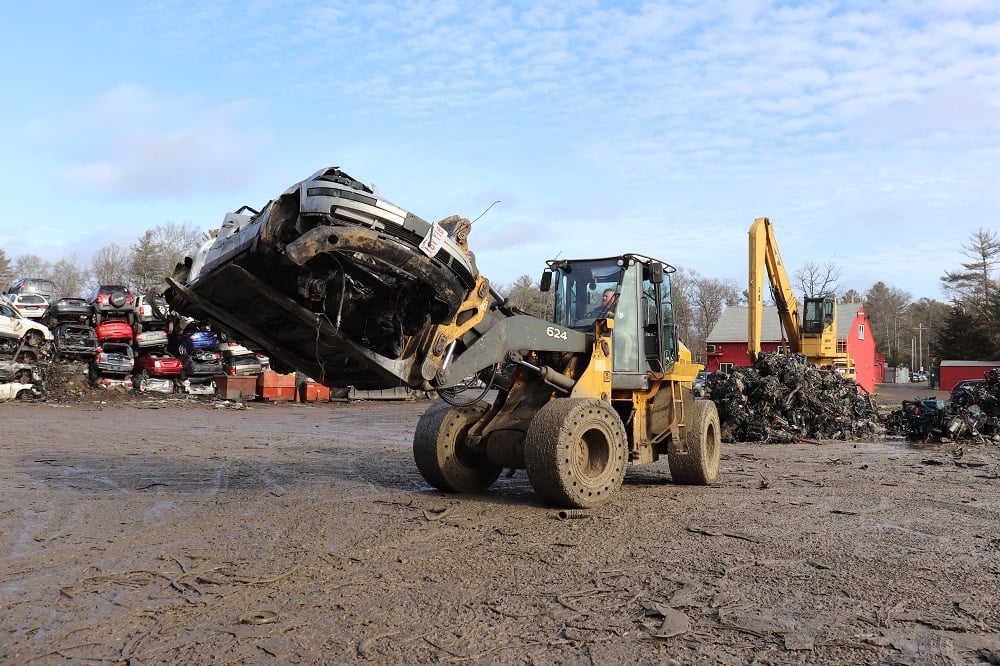Why Choose a Smooth Tire for Your Skid Steer or Loader
There is an abundance of tread patterns available to operators looking to equip their skid steers and loaders with application-specific tires. Whether it’s a super-deep tread like our Muddy Buddy or a technical tread such as our 550 MultiUse, the tread pattern of the tire you choose will have an enormous impact on your machine’s performance. Because tread patterns play a primary role in the way we talk about tires, we’re often asked why would someone choose a smooth tire (a tire without a tread)? And, what advantages do smooth tires offer?

What’s Driving Smooth Tires
Tire-equipped machines such as skid steers and loaders are the go-to equipment choice for work on hard surfaces. Visit any roadwork crew, demolition site, scrap or recycling yard and you’re sure to spot wheeled equipment doing the brunt of the work. While you’ll see some smooth tires among the bar-lug and block-tread tires on roadwork and construction sites, smooth tires are the go-to choice for applications like warehouses with concrete floors and recycling/trash/demolitions sites thanks to their resistance to scrubbing and chunking.
Smooth Patterns and Hard Surfaces
One of the primary purposes for the tread pattern on a skid steer or loader tire—no matter if it’s bars, blocks, or buttons—is to dig into the surface it’s working on for traction. Because surfaces such as asphalt and concrete are harder than the rubber of a tire, the tread pattern of a tire working on hard surfaces is unable to dig into them, which reduces their effectiveness. The exception occurs when a hard surface is covered in another material—for example, snow, manure, or moisture—where once again a tire’s tread plays an important role in dictating traction.
Since the tread pattern of a tire working on dry, hard surfaces does not contribute to the performance of a tire, many operators choose to use smooth tires. There are a host of benefits offered by a smooth tire when used on a hard surface—they provide a maximum contact patch, better traction, more rubber, increased durability, smoother ride, and, improved longevity.
The Benefits of Smooth Tires
Better Traction: The most obvious advantage of smooth tires compared to their patterned counterparts is that they simply put more rubber on the ground. The increased size of the contact area between the surface area of the tire’s tread and the ground leads to better traction (on dry surfaces). It’s one of the reasons why drag racers use slick tires.
More Rubber: Another benefit of smooth treads is that there are no nooks, crannies, or crevices for debris to work into; rather, it’s all rubber. This is especially beneficial for tires on machines working in demo, scrap, and recycling where everything from bits of steel to shards of glass can work themselves between lugs and into grooves—and, eventually, penetrate the casing—causing punctures and leading to unplanned downtime.
Increased Durability: In addition to puncture protection, smooth tires also are the most resistant to working on hard, abrasive surfaces. On harsh surfaces such as asphalt, every turn is scrubbing off a tire’s tread—this is especially true on machines like skid steers which are designed to make zero-radius turns by skidding.
Smoother Operation: Tire tread patterns are intended to bite into the ground for traction; consequently, they will try to gain traction no matter the surface they’re working on—even if it’s concrete or asphalt. This is particularly noticeable with aggressive grip-style tires, as they can cause machine bouncing as the tire tries to bite into the ground as it skids. Conversely, smooth tires more easily enable a skid steer’s namesake motion: skidding.
Increased Longevity: Smooth tires simply have more rubber in the tread area than a treaded tire, which means there is more rubber to wear away and longer life. Similarly, smooth tires are not dependent on a tread for their performance (many treaded tires diminish in their effectiveness as they wear.)
Application-Specific Tires
Machine operators are becoming increasingly aware of the effect tires have on their operation’s productivity and bottom line. In businesses like construction where every penny counts, the right set of tires can make the difference between ending the year in the red or the black. If you have a question about what type of tires you should run on your machines, want to learn about our excellent Galaxy Super Smooth solid tire, or one of our numerous application-specific patterned tires, contact your dealer or local rep today.


